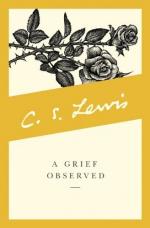
|
| Name: _________________________ | Period: ___________________ |
This test consists of 15 multiple choice questions and 5 short answer questions.
Multiple Choice Questions
1. What does the author think that H. would have thought must happen to weak faith?
(a) That weak faith has to grow stronger.
(b) That such faith must be held closely.
(c) That such faith must be knocked down.
(d) Religion must build up such faith.
2. At the beginning of the third chapter, what does the author say is the reason he does not think about H. all the time?
(a) His children take up his time.
(b) He tries to distract himself.
(c) Work and conversation get in the way.
(d) He is writing a book.
3. What kinds of mortal questions does the author think that God cannot answer?
(a) Questions about love.
(b) Questions about Christ.
(c) Questions about life and death.
(d) Nonsense questions.
4. About how many human questions does the author estimate cannot be answered by God?
(a) About 75%.
(b) None of them.
(c) About half.
(d) All of them.
5. By Chapter Four, how many gains does the author claim to have made?
(a) 2.
(b) 4.
(c) 1.
(d) 0.
6. What action does the author say is useless if God hurts to heal?
(a) Trying to heal oneself.
(b) Begging God for tenderness.
(c) Committing suicide.
(d) Thinking one can reverse any pain.
7. What did the Incarnation achieve, according to the author?
(a) It created a religion.
(b) It raised Lazarus from the dead.
(c) It ruined all previous ideas of the Messiah.
(d) It saved humanity.
8. What kind of "no answer" does the author get from God by the fourth chapter?
(a) A silent gaze.
(b) Absolutely no response.
(c) A complete answer.
(d) A locked door.
9. In Chapter Four, what does the author suddenly feel walking through nature?
(a) Surrender to fate.
(b) Deep loss.
(c) Invitation to pre-H. happiness.
(d) Faith in God.
10. To what does the author compare physical pain?
(a) A concentration camp.
(b) A broken relationship.
(c) A life without God.
(d) A steady barrage in a wartime trench.
11. In Chapter Three, what is the author finally able to do?
(a) Tidy up his house.
(b) Tend to his affairs.
(c) Talk to his children about H.
(d) Remember H. without forcing it.
12. Who is the source of the author's problem?
(a) H.
(b) Nobody.
(c) God.
(d) The author himself.
13. What does the author think might have influenced his love for H.?
(a) A desire to have children.
(b) Loneliness.
(c) Reflection of the author's love of God.
(d) Egoism.
14. Why does the author walk all he can?
(a) So he can go to bed tired.
(b) For his physical health.
(c) To work off his frustration.
(d) To avoid his feelings.
15. In the third chapter, what does the author decide is happening to his wife in the next life?
(a) She has become an angel.
(b) She is perfected in God's eyes.
(c) Absolutely nothing.
(d) God continues to "temper her."
Short Answer Questions
1. What purpose do images of H. serve for the author?
2. According to the author, what kind of faith cannot survive a serious challenge such as death?
3. When does the author claim he is at his worst?
4. In Chapter Three, to what does the author compare grief?
5. How many books does the author use to record his reflections?
|
This section contains 558 words (approx. 2 pages at 300 words per page) |

|




